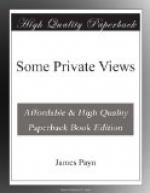It is a ‘far cry’ from the ‘Faery Queen’ to ‘Childe Harold,’ which, reckoning by years, is still a modern poem; yet I wonder how many persons under thirty—even of those who term it ’magnificent’—have ever read ‘Childe Harold.’ At one time it was only people under thirty who had read it; for poetry to the ordinary reader is the poetry that was popular in his youth—’no other is genuine.’
’A dreary, weary poem
called the Excursion,
Written in a manner which
is my aversion,’
is a couplet the frankness of which has always recommended itself to me (though I like the ’Excursion’); but, except for the rhyme, it has a fatal facility of application to other long poems. Heaven forbid that I should ‘with shadowed hint confuse’ the faith in a British classic; but, ye gods, how men have gaped (in private) over ‘Childe Harold!’
‘Gil Blas,’ though not a native classic, is included in the articles of the British literary faith; not as a matter of pious opinion, but de fide; a necessity of intellectual salvation. I remember an interview I once had with a boy of letters concerning this immortal work; he is a well-known writer now, but at the time I speak of he was only budding and sprouting in the magazines—a lad of promise, no doubt, but given, if not to kick against authority, to question it, and, what was worse, to question me about it, in an embarrassing manner. The natural affability of my disposition had caused him, I suppose, to treat me as his Father Confessor in literature; and one of the sins of omission he confided to me was in connection with the divine Le Sage.
’I say—about “Gil Blas,” you know—Bias [a great critic of that day] was saying last night that if he were to be imprisoned for life with only one book to read he would choose the Bible or “Gil Blas."’
‘It is very gratifying to me,’ said I, wishing to evade my young friend, and also because I had no love for Bias, ’that he should have selected the Bible, even as an alternative; and all the more so, since I should never have expected it of him.’
‘Yes, papa’ (that was what the young dog was wont to call me, though he was no son of mine—far from it); ’but about “Gil Blas”? Is it really the next best book? And after he had read it—say ten times—would he not have been rather sorry that he had not chosen—well, Shakespeare, for instance?’
The picture of Bias with a long white beard, the growth of twenty years, reading that tattered copy of ‘Gil Blas’ in his cell, almost affected me to tears; but I made shift to answer gravely: ’Bias is a professional critic; and persons of that class are apt to be a little dogmatic and given to exaggeration. But “Gil Blas” is a great work. As a picture of the seamy side of human life—of its vices and its weaknesses at least—it is unrivalled. The archbishop——’




